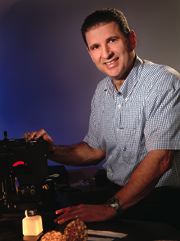Reynaldo Roque, Ph.D.
Professor of Civil and Coastal Engineering
College of Engineering
2005 Awardee
 Rey Roque could be more important to the health of your car than a mechanic; his research in transportation infrastructure has changed the roads we drive on.
Rey Roque could be more important to the health of your car than a mechanic; his research in transportation infrastructure has changed the roads we drive on. As a professor in civil & coastal engineering, Roque knew moving to Florida was good for his career. As one of the fastest growing states in the nation, Florida continually faces transportation problems associated with growth.
“Infrastructure is a major component of our economic development,” Roque says. “What brought me here was the opportunity in Florida, the team that was here and the diversity of people. I wanted to do more advanced work in this field and the growth of transportation in Florida makes it the place to be.”
Roque tackles the continuing problem of constructing and maintaining roads by studying asphalt concrete – comprised of hundreds of different types of rock and asphalt from all over the world. Understanding how these components behave together is imperative to understanding how long a road will last and how it will wear.
“Understanding at the smallest level of interaction how these materials behave and what makes them hold together and not crack, is an ongoing endeavor,” he says. “Our work in the next few years is trying to get a better understanding, developing advanced models and using that information to enhance performance of roads.”
But looking at what comprises the asphalt means little without also understanding how the cars that drive on it affect its durability. Besides extensive use of modeling, Roque tests his research in real-world conditions.
“In Gainesville, the Florida Department of Transportation has one of only five accelerated pavement testing facilities in the entire world,” he says. “It is a heavy vehicle simulator where we can test roads under real truckload conditions and simulate the effects of traffic over a 20-year period in a couple of months.”
Roque says Florida’s Department of Transportation is a national leader in looking at different methods to reduce the environmental strain of building a transportation infrastructure.
“The Florida DOT are leaders and very supportive in our efforts,” he says. “We work closely with them and they support a lot of our research.”

